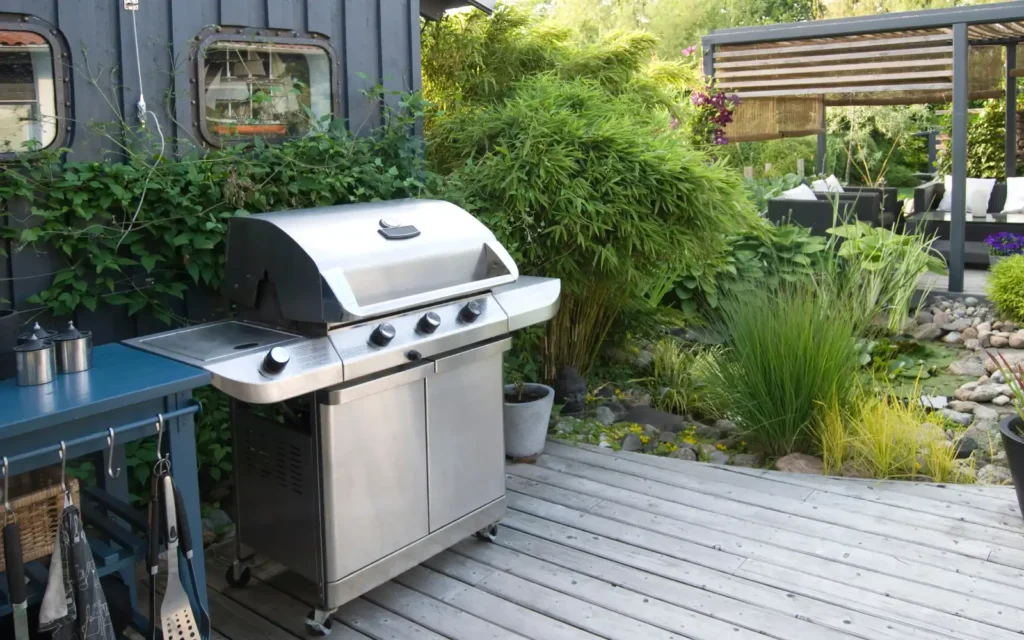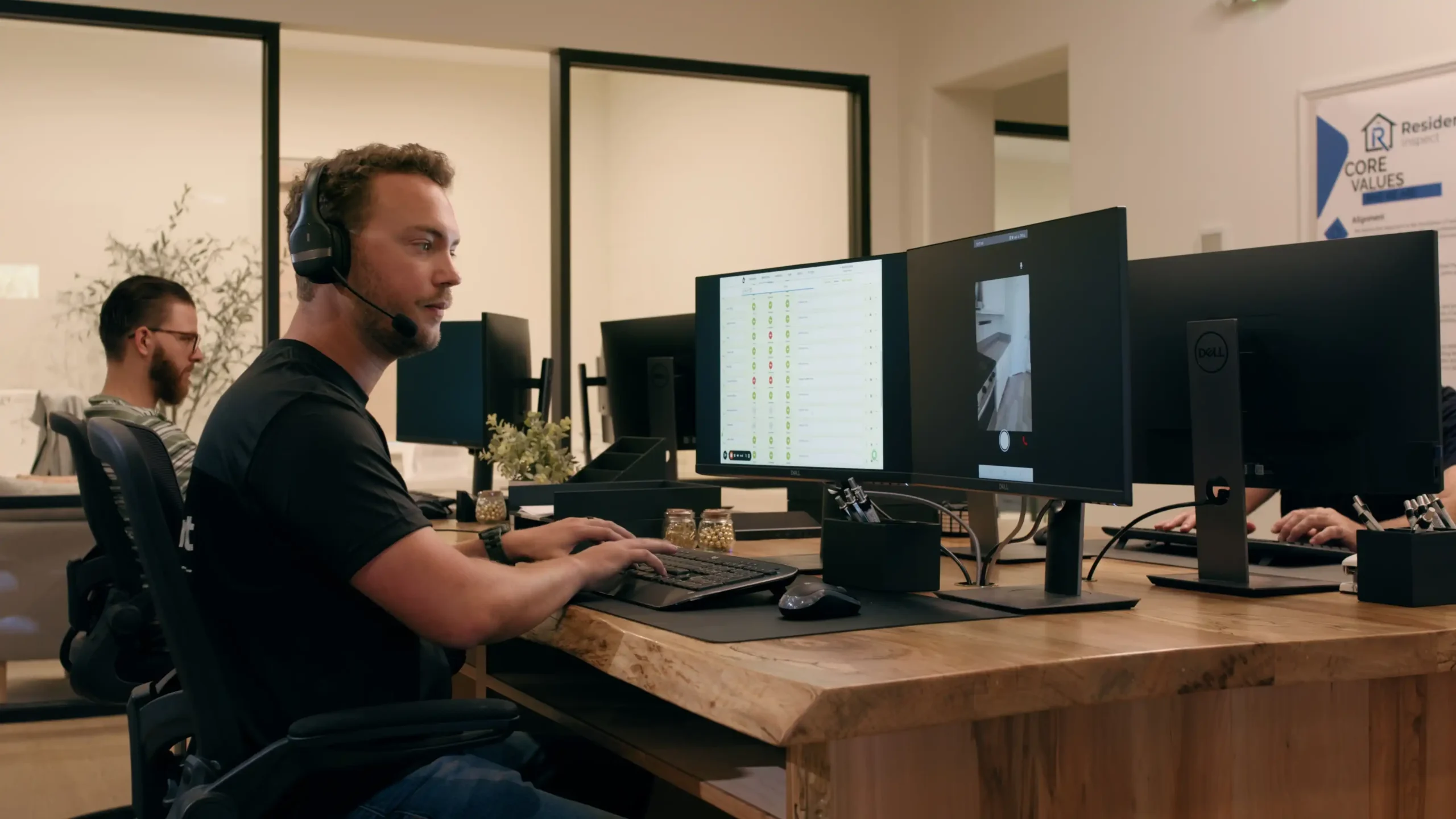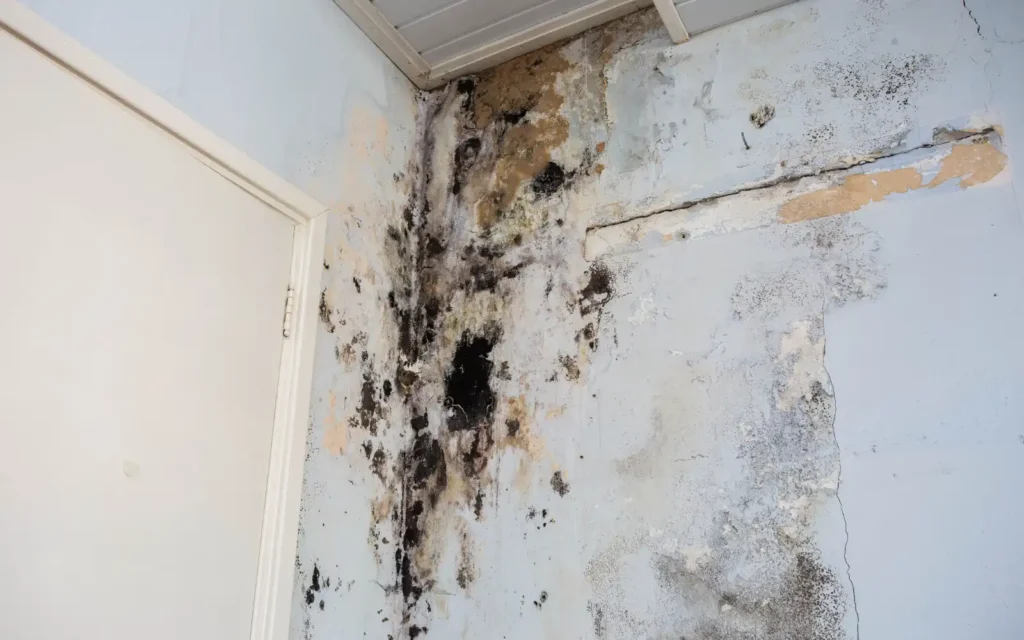
The Hidden Costs of Property Maintenance & How Smart Property Managers Stay Ahead
Property maintenance is the resident evil of property management. It’s the part of the job that keeps tenants and owners happy, properties in good shape, and legal headaches at bay. But it’s also a money pit, and a massive time drain, and nobody really wants to be spending their days chasing contractors to fix problems on houses they don’t even own.
If you’ve been in property management (or even just owned your home) for more than five minutes, you already know that a small maintenance issue can quickly spiral into a costly repair. Even a minor leak under the sink will turn into a $10,000 mold remediation project in a few months if not identified and quickly fixed. And if a tenant’s stove stops working and you’re not on top of the repair, they might take matters into their own hands and wheel a gas grill into the kitchen (yes, this actually happened).
We sat down with Aaron Cooper, property management veteran and founder of Resident Inspect, to discuss how maintenance eats into your budget, why inspections matter, and how technology is making it easier than ever to stay ahead of costly problems. Whether you’re managing 20 properties or 500, this guide will help you protect your bottom line, reduce stress, and keep both tenants and owners happy.
- The True Cost of Property Maintenance (And Why It’s More Expensive Than You Think)
- Real-World Maintenance Nightmares (And How to Avoid Them)
- How Smart Property Managers Stay Ahead of Maintenance Issues
- The Psychology of Maintenance
- Handling Maintenance Emergencies Like a Pro
- Legal & Compliance Risks in Property Maintenance: What Property Managers Need to Know
- The Future of Property Maintenance: AI, Automation & Smarter Tech
- Final Thoughts
The True Cost of Property Maintenance (And Why It’s More Expensive Than You Think)
Maintenance isn’t a budget line item – it’s a full-time job for most property managers. According to Buildium’s 2023 Industry Report, property managers spend 46% of their time dealing with maintenance-related tasks. That’s nearly half the workweek spent chasing repairs, coordinating vendors, and handling tenant complaints.
And the costs add up fast.

Breaking Down the Expense
Property maintenance expenses typically fall into three categories:
- Routine Repairs – Fixing leaky faucets, HVAC servicing, patching drywall. These are the predictable (but still costly) jobs that keep properties livable.
- Emergency Maintenance – Flooded basements, electrical failures, HVAC breakdowns in peak summer. These come with hefty vendor charges and (as you know) are major headaches.
- Deferred Maintenance – The “I’ll get to it later” category that often results in five-figure repair bills down the road simply because you don’t have the time in the day to sweat the minor repair jobs.
“Maintenance is one of the biggest time and cost burdens on property managers – It’s not a revenue generator, but how you handle it determines whether owners see you as an asset or a liability.”
In other words, efficient maintenance isn’t just about protecting your properties – it’s also about protecting your reputation.
If you’re serious about property management, you need to treat your clients’ properties as your own, and that means keeping on top of maintenance. The client experience needs to be firmly in your crosshairs if you want to keep them as clients. Showing that you’re fixing small problems before they become big problems demonstrates to your client that you’re at the top of your game and that they’re in good hands.
The Hidden Costs of Property Maintenance
When property managers think about maintenance expenses, they usually focus on labor, materials, and vendor fees. But the real financial drain comes from hidden costs – the ones that don’t show up on an invoice but can eat into your profits just as fast.

Tenant Dissatisfaction & Turnover
Delayed or poorly handled maintenance frustrates tenants, leading to higher vacancy rates. Studies show that 70% of tenants cite slow repairs as a reason for moving out. Every turnover means advertising costs, unit prep, and lost rent, which can easily total $2,500+ per vacant unit.
Lease Violations & Property Damage
Ignoring small repairs often leads to bigger problems. A tenant with a broken HVAC system might bring in unauthorized space heaters, increasing fire risk. If plumbing leaks are left unchecked you can expect water damage, mold growth, and costly remediation. Without routine inspections, lease violations (like unauthorized pets or subletting) go unnoticed – until it’s too late, the damage is done, and the property owner is left to foot the bill while cursing your name.
Legal Liabilities & Compliance Risks
Every state has habitability laws requiring landlords to maintain safe, livable conditions. If a neglected repair leads to injury, illness, or property damage, you could be facing legal action. Mold exposure, broken stair railings, and unaddressed electrical issues are lawsuits waiting to happen.

The Cost of Emergency Repairs
When maintenance isn’t proactive, it becomes reactive – which means higher costs. Emergency repairs often come with high rates, and scrambling for last-minute contractors means you’ll pay whatever they charge.
The solution? Preventative maintenance and regular inspections. By catching issues early, property managers save money, reduce risk, and keep tenants happy. But conducting regular inspections has its own ungodly time and cost impacts for property managers, which is exactly why Resident Inspect is changing the face of property inspections.
Real-World Maintenance Nightmares (And How to Avoid Them)
We often hear the same stories over and over again from property managers, but every now and then one stands out as particularly bad. Here are some of the worst maintenance issues that keep us up at night.
The Hidden Plumbing Disaster
A slow drip under the sink isn’t exactly a 911 situation, but as discussed left unchecked, minor leaks turn into wood rot, cabinet damage, and eventually mold. Aaron recalls one case where a property manager didn’t catch a leak for years, and by the time they did, the remediation cost was over $10,000. If they had properly inspected their property, they would have been able to fix the leak for under $200.
And the problem with mold is that once it’s colonized, it’s nearly impossible to get rid of, even when paying that hefty price tag for professional remediation. Many property managers and landlords are tempted to do a rough patch-up job to hide the problem and avoid the expense, but the health effects of living in mold (and the potential legal liability as a result) can and should scare you off this path.

How to prevent it: Routine inspections catch leaks before they escalate. A quick check under sinks and around toilets during inspections can save thousands in future repairs. Don’t cut corners on your inspections!
The Tenant Who Bypassed a Broken Stove
In one of the more extreme cases, a tenant whose stove had been broken for two years decided to take matters into their own hands by bringing a gas grill inside the house and disabling the smoke and carbon monoxide detectors.
Now this is dangerous on multiple fronts: Not only could the house have burned down, but the resident could have become seriously ill from carbon monoxide poisoning, and all because the property manager was unresponsive and didn’t schedule the repair promptly.

How to prevent it: Regular mid-lease inspections ensure tenants aren’t living with (or creating) hazardous conditions. Virtual inspections make it even easier to check in without physically visiting the property, but you can’t leave it up to the tenant to do their own inspection – it’s better to leave it to the professionals.
Lease Violations That Could Cost You Thousands
Unauthorized pets, illegal sublets, backyard trampolines – these violations can lead to liability issues, extra wear and tear, and even legal trouble.
And this is why routine inspections are a must. Back in 2021, a $1.5m home in a gated prestigious neighborhood was rented out. After a random inspection, numerous beds were found throughout the house. Lots of questions were being asked which quickly turned into a police raid of the property: it was found that the home was being used a brothel, and could have landed the property manager and landlord in hot water. You can read more about that story here.
“One of the biggest benefits of routine inspections is catching these issues early. You don’t want to find out about a 100-pound Rottweiler in the unit when the lease clearly states no pets, or worse.”
How Smart Property Managers Stay Ahead of Maintenance Issues
Proactive maintenance is all about preventing problems before they become the stuff of nightmares. Here’s how top property managers stay ahead.
Schedule Preventative Maintenance During Off-Seasons
Most property managers react to maintenance issues instead of preventing them. For example, scheduling annual HVAC servicing in the fall or winter ensures you’re not scrambling when summer heatwaves hit. Nobody wants to have their phone ringing with tenant complaints when the 15-year-old HVAC system goes kaput. The same goes for roof maintenance – cleaning gutters before spring rains can prevent thousands in water damage, keeping tenants and owners happy.
Implement a System for Maintenance Tracking

Using property management software that allows for recurring work orders can save countless hours. Even simple hacks – like scheduling auto-email reminders for future maintenance – can make a big difference for those on a budget.
And this speaks to a wider point for property managers – the more you can systematize and automate or delegate in your business, the more you stand to earn in the long run as you stop spending your valuable time on $2 tasks.
Embrace Virtual Inspections
Instead of driving to 500 properties every year, virtual inspections allow property managers to monitor homes remotely. Tenants walk the inspector through the property via live video, ensuring every issue is documented – without wasted time or travel expenses.
“We’ve seen property managers cut their inspection costs by 60% using virtual inspections, and they’re actually more thorough than in-person visits.”
The Psychology of Maintenance
There are lots of reasons why a property manager might defer repairs – you’re pretty busy, right? But avoiding these maintenance tasks actually has a negative psychological effect on your tenant, which can lead to worse problems in future.
How Maintenance Affects Lease Renewals
Tenants expect repairs within 24–48 hours – a slow response damages trust, which increases turnover and increases your costs. If you want to maximize profitability you want to keep your tenants in your property for as long as possible, and that means showing your tenants that you care about their living conditions. If your tenant feels you care about the small stuff, they’ll feel looked after and be more likely to renew their lease.

The “Broken Window” Theory in Property Management
The Broken Window Theory is used in criminology to suggest that visible signs of neglect and disorder, like broken windows, can lead to higher crime rates in those areas. In the same way, neglecting small property repairs can snowball into bigger problems. If tenants see cracked walls, broken locks, or neglected landscaping, they assume management doesn’t care, resulting in:
- More lease violations (because tenants stop caring for the unit).
- Delayed rent payments (because if management is unresponsive, tenants follow suit).
- Higher vacancy rates (because tenants leave for better-managed buildings).
How to Prevent This
- Schedule quarterly maintenance check-ins and inspections.
- Encourage tenants to report small issues before they escalate.
- Use virtual inspections to check problem areas without in-person visits, saving you time and money.

Handling Maintenance Emergencies Like a Pro
Set Up an Emergency Response Plan
There’s never a good reason your phone rings at 3am. Emergency maintenance calls always happen at the worst possible time. To avoid middle-of-the-night panic, property managers need:
- A designated on-call team for after-hours emergencies
- A clear emergency protocol tenants can follow (remember systematizing everything? This is part of that)
- Pre-established vendor relationships with 24/7 service providers
If any one of those three things is missing, the emergency can quickly deteriorate into a disaster and a potential lawsuit. We’ll have some specific tips for you in some of these areas coming up.
Educate Tenants on What Qualifies as an Emergency
Not every issue requires immediate intervention. If tenants understand what actually counts as urgent, property managers get fewer unnecessary calls. Tenants also appreciate clear guidance around what they can and can’t contact you for – clear communication will build trust with tenants too!
Have Reliable Contractors on Speed Dial
Finding trustworthy vendors before you need them is key. “We keep relationships with both small contractors and big companies,” Aaron explains. “Small vendors are cost-effective, but larger firms can guarantee 24/7 service.”
Legal & Compliance Risks in Property Maintenance: What Property Managers Need to Know
Regular property maintenance helps to avoid costly legal battles and ensures compliance with state and federal regulations. When repairs are neglected, landlords and property managers don’t just risk financial losses from tenant turnover; they open themselves up to lawsuits, government fines, and reputational damage. Here we’ll discuss the key legal risks in property maintenance and how to stay compliant.
Negligence & Liability: When Delayed Maintenance Becomes a Lawsuit
Ignoring maintenance requests is plain bad business practice, but it can be considered negligence in court. If a tenant slips and falls on a broken step, suffers health issues from mold, or gets injured due to faulty wiring, the landlord or property manager can be held legally responsible. And trust us, you don’t want that on your already full plate.
For example: You could face a $50,000 lawsuit after ignoring a tenant’s repeated complaints about mold. If the tenant develops severe respiratory issues, and if you fail to document any attempt to fix the issue, the court will likely rule in the tenant’s favor. Cases like this happen every year, and settlements or judgments can easily exceed six figures.
To avoid these risks, property managers must act promptly on maintenance requests and keep thorough records of all repairs, inspections, and tenant communications.

State & Federal Compliance: What Property Managers Must Provide
Property managers must comply with state habitability laws, which outline the minimum living standards landlords are required to provide. While laws vary by state, some fundamental requirements apply nationwide:
- Heating & Cooling: Landlords must provide adequate heating in colder months. Some states also require working air conditioning.
- Running Water & Sanitation: Access to clean water, functioning plumbing, and proper waste disposal is non-negotiable.
- Structurally Sound Living Conditions: Properties must be safe and livable, with no serious electrical, foundation, or roofing hazards.
- Pest-Free Units: Infestations of mice, roaches, or bedbugs must be addressed, as they pose health and safety concerns.
- Smoke & Carbon Monoxide Detectors: Many states require landlords to install and maintain these life-saving devices.
Some states have even stricter regulations. For example,
- California: Landlords must provide heating, ensure sewage systems function properly, and fix any issues affecting tenant health and safety.
- New York: Tenants have a right to safe, sanitary, and properly maintained housing, with landlords required to provide hot water year-round and heat from October to May.
Failing to comply can result in government fines, lawsuits, and even eviction bans until repairs are made.
How Virtual Inspections Help Property Managers Stay Compliant
One of the biggest challenges property managers face is proving they responded to maintenance issues in a timely manner. This is where virtual inspections can transform your bottom line, providing:
- Timestamped Photo & Video Reports: Virtual inspections provide documented proof of property conditions, making it easy to defend against false tenant claims.
- Efficient Issue Tracking: Reports ensure that no maintenance request slips through the cracks, reducing the risk of lawsuits for negligence.
- Improved Record-Keeping: Property managers can store digital reports indefinitely, making it easier to prove compliance with state laws.
By implementing proactive inspections and digital documentation, property managers reduce liability risks, improve response times, and avoid costly legal battles.
The Future of Property Maintenance: AI, Automation & Smarter Tech
Historically, change has been slow in property management. It usually takes a long time, years or even decades, for advances in technology to filter through and become widely adopted. Property maintenance however is changing fast, with some incredible tools about to come online. Here’s what’s coming next.
AI-Driven Maintenance Requests
AI-powered software can troubleshoot tenant issues before assigning a vendor. That means fewer unnecessary service calls, faster fixes for common issues and reduced maintenance expenses.
This may look like tenants chatting with an AI chatbot hosted on your website to diagnose and potentially fix the issue, before the issue is escalated to a human. AI could even look at past data, e.g. previous maintenance logs, to foresee potential problems and schedule inspections before problems arise. Smart home technology can also be leveraged to inform AI troubleshooting.

Remote Inspections for Work Order Follow-Ups
Instead of relying on vendors to send blurry photos, property managers can jump on a five-minute virtual inspection with tenants to confirm the repair. Or they can even outsource these inspection tasks to trusted third parties, allowing them to focus on more profitable activity.
“We don’t just use virtual inspections for routine check-ins. We also use them to verify work was done properly.”
Automated Work Orders & Scheduling
Automated maintenance systems are expected to be standard in property management software within the next year. This way property managers won’t need to remember to schedule seasonal gutter cleans, and tenants will be able to log problems, which are triaged by AI, and an appropriate vendor is automatically assigned, briefed and scheduled, all without input on the manager’s part. Property managers who adapt and implement these systems early will save time, money, and stress, and frankly grow their businesses faster.
Final Thoughts
Property maintenance will never be fun, but it doesn’t have to be an endless headache. Here are the top 7 takeaways from this article:
- Property Maintenance is a Massive Time Drain for Property Managers
Property managers spend nearly half their workweek handling maintenance tasks, from chasing vendors to responding to tenant complaints. While necessary, maintenance doesn’t generate revenue, yet it directly impacts tenant retention, owner satisfaction, and legal compliance. - The Hidden Costs of Maintenance Go Beyond Labor and Materials
Tenant dissatisfaction, lease violations, and legal risks create financial burdens. Poorly handled maintenance leads to higher vacancy rates, costly damage, and even lawsuits if landlords fail to provide habitable conditions. - Deferred Maintenance is a Budget Killer
Small repairs left unattended turn into five-figure expenses down the line. A minor leak today can result in mold remediation, while an ignored HVAC issue can lead to emergency replacement at a hefty price tag. - Routine & Virtual Inspections Prevent Costly Surprises
Regular property inspections catch issues before they escalate. Virtual inspections offer an efficient alternative, reducing travel time and enabling managers to check properties without stepping foot on-site. - Legal & Compliance Risks are a Major Liability
Neglecting maintenance violates state habitability laws and exposes landlords to lawsuits. Property managers must ensure properties remain safe, livable, and in compliance with state and federal regulations. Failing to do so can lead to massive legal settlements. - Technology & AI Are Transforming Property Maintenance
AI-driven maintenance requests, automated work orders, and virtual inspections are set to transform how property managers handle repairs. Early adopters of these technologies will save time, money, and stress. - Building an Emergency Vendor Network isn’t an “I’ll get to it” item
Having pre-screened vendors for urgent repairs prevents last-minute scrambling. Property managers should establish clear service contracts, response time guarantees, and backup vendor options to avoid overpriced emergency fees and unreliable contractors.
If you’re looking to stay ahead of costly repairs and streamline your maintenance process, Resident Inspect is here to help. Book a consultation today and see how virtual inspections can transform your workflow.
